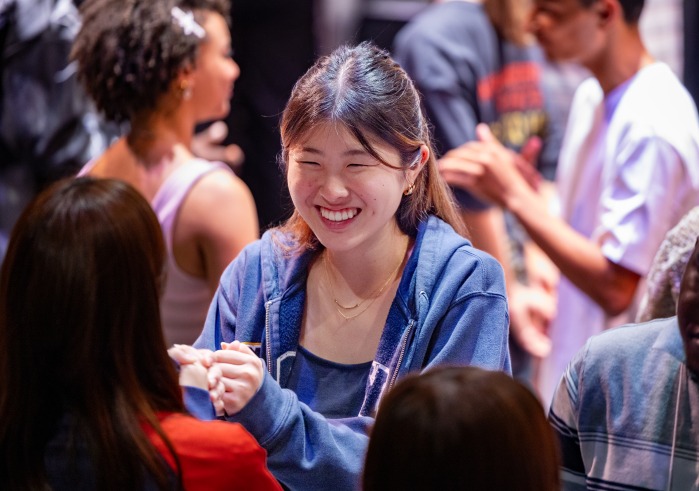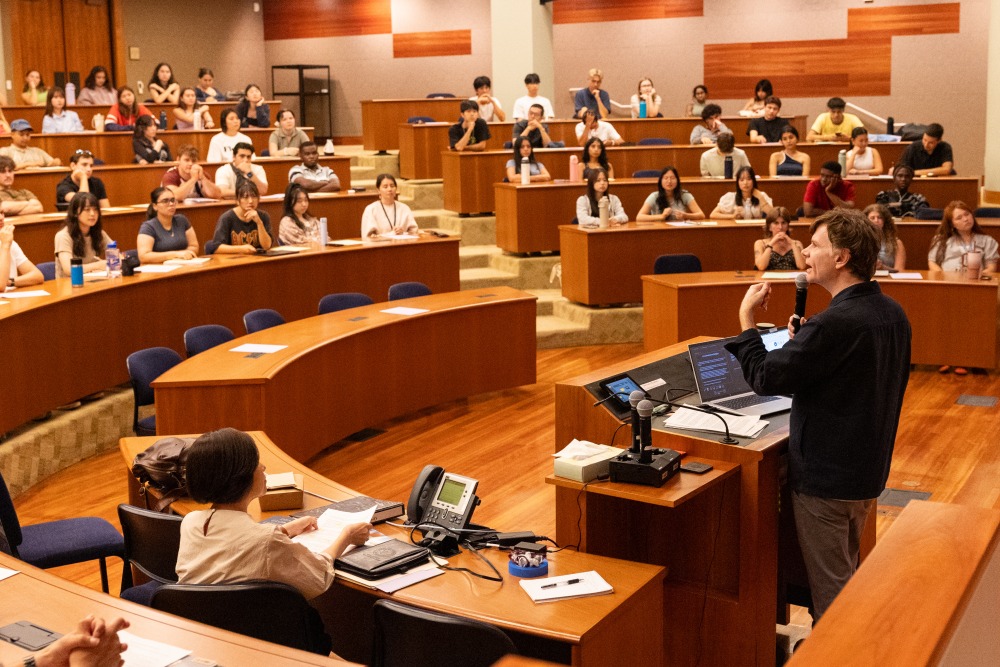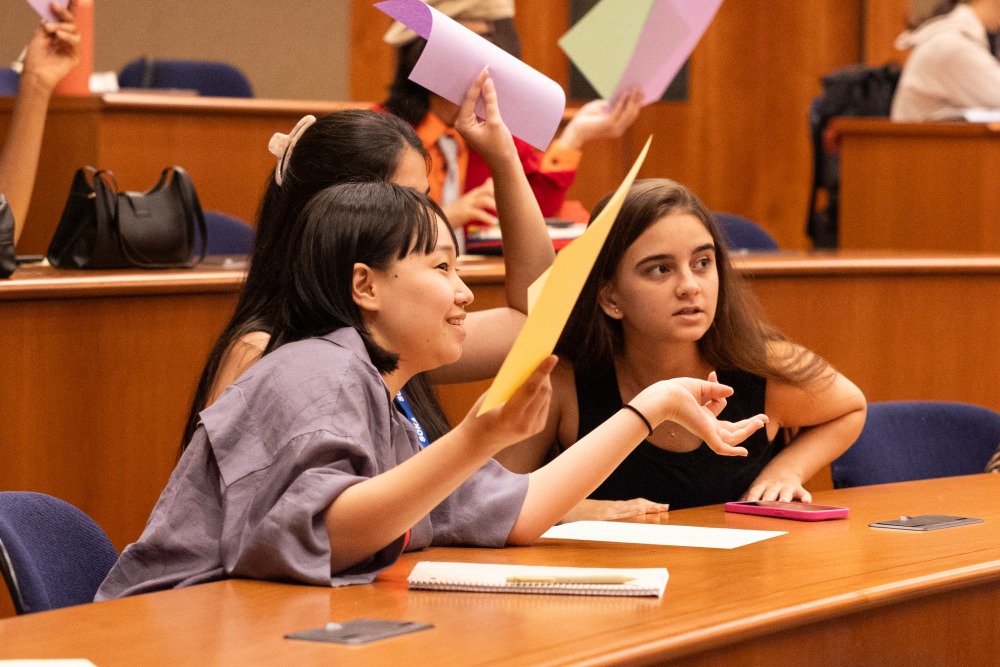Education With Purpose: Orientation Helps First-Years Set the Course for Meaningful Academic Journeys

“At Soka, we believe that education does not begin when you choose an area of study or take an exam,” said Associate Dean of Faculty Ian Read, addressing the Class of 2029 during the academic opening session on August 7. “Education begins when you start to ask meaningful questions about yourself and think about your role in the world and the kind of person you want to become.”
At this Welcome Week event, first-year students learned about each of the five academic concentrations at SUA — Environmental Studies, International Studies, Humanities, Life Sciences, and Social and Behavioral Sciences — and had the opportunity to participate in small group information sessions on two concentrations of their choice. Notably, students only began to explore the specifics of each concentration after engaging in a dialogue-based session on what a liberal arts education means and how they can use it to make an impact as global citizens.
Assistant Dean of Global Citizenship Sandrine Siméon laid the groundwork for this discussion with a brief presentation on global learning, which education scholars Hilary Landorf and Stephanie Doscher define as “the process of diverse people collaborating on complex problems that transcend borders and engaging in actions that promote collective well-being.” Siméon encouraged students to reflect on how global learning connects to the four main areas of global citizenship education outlined by SUA founder Daisaku Ikeda: peace, human rights, development, and sustainability.
“Keep in mind,” Siméon said, “that becoming a global citizen means acquiring a sense of responsibility toward local and global issues and understanding their interdependence. You’ll be encouraged to consider perspectives, cultures, and matters that affect not only you personally, but also different people in many parts of the world.”
The discussion that followed was guided by two thought-provoking questions: What kind of person do you want to become by the time you graduate? What is a problem in the world that matters to you, and how might an education help you address it? As students tackled these questions, first in pairs and then with the entire class, it was clear that they had already been thinking deeply about these topics. Students shared how they envision their education helping them contribute to global solutions for the climate crisis, economic inequality, and diseases like cancer. Others expressed that they hope to grow more confident in their knowledge of different issues and more courageous about speaking up.
Lisa MacLeod, assistant dean of student success, concluded this part of the academic opening session by encouraging students to define for themselves what success means beyond passing their courses and earning a bachelor’s degree in liberal arts.
“Look for opportunities available to you inside and outside the classroom to build toward that long-term goal,” she said. “Take time to meet with your academic advisor throughout the semester as you’re thinking about how your academic life fits into your evolving plan for being a lifelong learner and global citizen.”
Deepening the Conversation: Engaging with SUA’s Founding Principles
Jason Goulah, distinguished visiting professor of Ikeda Studies, expanded the discussion about the purpose of a college education at a session covering the philosophical underpinnings of how learning works at SUA. He introduced students to four concepts at the core of Ikeda’s humanistic approach to education: dialogue, global citizenship, creative coexistence, and value creation.
On the concept of dialogue, Goulah explained that Ikeda viewed education as an active process in which teacher and student learn together, mutually contributing to each other’s growth and development. At SUA, this idea is reflected not only in the small class sizes and access to one-on-one mentorship with faculty, but in the way instructors teach the material, continually seeking input and participation from students.
Goulah applied this method throughout the session, asking students to work in groups of three and come to a consensus in response to questions he posed. For example, he asked groups to collectively decide what type of dialogue they felt they most needed to cultivate in their lives: dialogue with themselves, reflecting on their own beliefs and attitudes; in-person dialogue with people of different cultures and beliefs; or dialogue with nature and great works of art. Students fully engaged with the question, sharing thoughtful reasoning to explain their varied responses.
“Your life over the next four years,” Goulah said, “will be a project of engaging in all these forms of dialogue in ways you never imagined.”
Students also explored what global citizenship means, unpacking the three primary characteristics of a global citizen — wisdom, courage, and compassion — that Ikeda identified in “Thoughts on Education for Global Citizenship,” a speech he delivered at Teachers College, Columbia University, in 1996. Students considered which characteristic they think humanity most lacks in the present day and reflected on which qualities they need to develop within themselves.
In this way, students not only learned about the founding principles of SUA, but thought about how these values apply to current global events, their lives today, and their plans for the future. The wisdom they’ll strive for as students, Goulah said, can enhance their understanding of how their lives are interdependent with the lives of others, increasing their capacity for compassion. This, in turn, can strengthen their commitment to peace, human rights, and a creative coexistence with the natural world through responsible environmental stewardship.
The discussion also dove into the meaning of value creation, which Ikeda defined as “the capacity to find meaning, to enhance one’s own existence, and to contribute to the well-being of others under any circumstance.” An education, at its best, Goulah explained, can help students create different kinds of value, whether that’s through illuminating the complex issues our world faces, giving students the tools to support themselves economically, or helping them pursue paths that serve others.
Goulah emphasized that college is a very special and formative time. Students have the opportunity to build lifelong friendships, expand their horizons, and experience tremendous personal growth.
“You’re embarking on an amazing part of your life that will never happen again,” he said. “You really have to make the most of it.”


